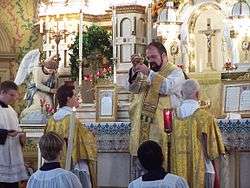None (liturgy)
None (/ˈnoʊn/ NOHN), or the Ninth Hour, is a fixed time of prayer of the Divine Office of almost all the traditional Christian liturgies. It consists mainly of psalms and is said around 3 p.m. Its name comes from Latin and refers to the ninth hour of the day after dawn.
This hour is now described more generally as the "midafternoon prayer" and may be said whenever convenient during the day, or omitted entirely. However, bishops and priests are still expected to recite the full sequence of hours, as closely as possible to the traditional time of day.
Eastern Christian Office
In the Eastern Orthodox and Greek Catholic Churches the office of the Ninth Hour is normally read by a single Reader and has very little variation in it. Three fixed psalms are read at the Third Hour: Psalms 83, 84, and 85 (LXX). The only variable portions for most of the year are the Troparia (either one or two) and Kontakion of the Day. The service ends with the Prayer of the Ninth Hour by Saint Basil the Great.

Liturgy
Liturgy (Greek: λειτουργία) is the customary public worship performed by a specific religious group, according to its particular beliefs, customs and traditions.
The word, sometimes rendered by its English translation "service", may refer to an elaborate formal ritual such as the Eastern Orthodox Divine Liturgy (Greek: Θεία Λειτουργία), Catholic Mass, the Eucharist or Mass (Anglican Communion) or a daily activity such as the Muslim salah and Jewish services. As a religious phenomenon, liturgy is a communal response to the sacred through activity reflecting praise, thanksgiving, supplication, or repentance. Ritualization may be associated with life events such as birth, coming of age, marriage and death. It thus forms the basis for establishing a relationship with a divine agency, as well as with other participants in the liturgy. Methods of dress, preparation of food, application of cosmetics or other hygienic practices are all considered liturgical activities.
Etymology
The word liturgy, derived from the technical term in ancient Greek, leitourgia, signifies the often expensive offers of service to the people, and thus to the polis and the state. Through the leitourgia, the rich carried a financial burden and were correspondingly rewarded with honours. The leitourgia became both mandatory and honorific, supporting the patron's standing among the elite. The holder of a Hellenic leitourgia was not taxed a specific sum, but was entrusted with a particular ritual, which could be performed with greater or lesser magnificence. The chief sphere remained that of civic religion, embodied in the festivals: M.I. Finley notes "in Demosthenes' day there were at least 97 liturgical appointments in Athens for the festivals, rising to 118 in a (quadrennial) Panathenaic year." Eventually, under the Roman Empire, such obligations, known as munera, devolved into a competitive and ruinously expensive burden that was avoided when possible.
Liturgy (disambiguation)
Liturgy is a Christian term with several meanings:
Liturgy may also refer to:

Eucharist in the Catholic Church
The Eucharist in the Catholic Church is the celebration of Mass, the eucharistic liturgy. The term Eucharist is also used for the bread and wine when transubstantiated (their substance having been changed), according to Catholic teaching, into the body and blood of Jesus Christ
Blessed Sacrament is a devotional term used in the Roman Catholic Church to refer to the eucharistic species (the Body and Blood of Christ). Consecrated hosts are kept in a tabernacle after Mass, so that the Blessed Sacrament can be brought to the sick and dying outside the time of Mass. This makes possible also the practice of eucharistic adoration.
New Testament foundations
The First Eucharist in Scripture
The Catholic Church sees as the main basis for this belief the words of Jesus himself at his Last Supper: the Synoptic Gospels (Matthew 26-28; Mark 14:22-24; Luke 22:19-20) and Saint Paul's 1 Corinthians 11:23-25 recount that in that context Jesus said of what to all appearances were bread and wine: "This is my body … this is my blood." The Catholic understanding of these words, from the Patristic authors onward, has emphasized their roots in the covenantal history of the Old Testament.
None
None may refer to:
Music
See also
Independent politician
An independent or nonpartisan politician is an individual politician not affiliated to any political party. There are numerous reasons why someone may stand for office as an independent.
Some independent politicians may be associated with a political party, perhaps as former members of it, or else have views that align with it, but choose not to stand in its name, or are unable to do so because the party in question has selected another candidate. Others may belong to or support a political party at the national level but believe they should not formally represent it (and thus be subject to its policies) at another level.

None (Meshuggah EP)
None is an EP by Swedish metal band Meshuggah. It was released on November 8, 1994, by Nuclear Blast. The band started embracing a more complex approach that would lay the grounds for their later style. The EP is out of print, but the first four tracks are also available on the Contradictions Collapse reissue while the fifth track is on the Destroy Erase Improve reissue. This is the band's first release to feature rhythm guitarist Mårten Hagström.
Track listing
Personnel
Podcasts:

